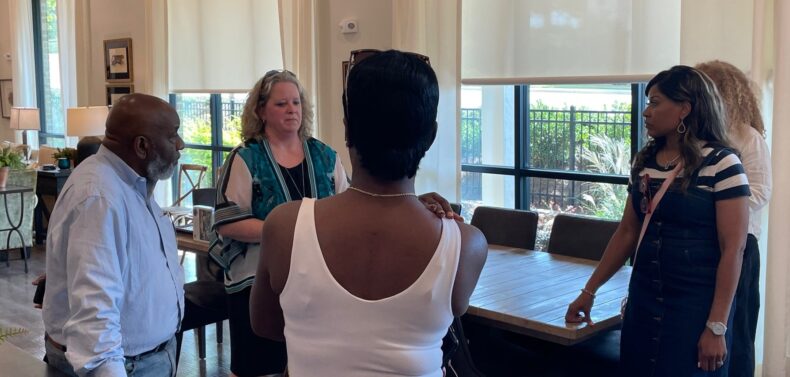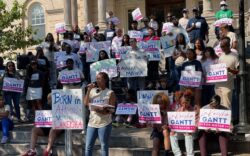Mayor Kelly Girtz, seven Athens-Clarke County commissioners and a half-dozen other local officials traveled to Gainesville, GA on Sept. 19–20 to talk about long-range plans and tour their host city’s affordable housing developments.
Like Athens, Gainesville is a regional hub for industry and health care where many workers struggle to afford housing. Gainesville Mayor Sam Couvillon, a Republican, said his city has added 500 affordable units during his tenure but needs more. “If we tripled our affordable housing units, it would not be enough,” he told the Athens group.
One of the stops was Walton Landing, where Gainesville used state and federal tax credits to partner with a private developer to replace 32 aging public housing units with 164 new ones, all affordable for people making 60% of the area median income. Some are set aside for seniors 55 and up. Gainesville contributed $1 million in federal Community Development Block Grants for water and sewer infrastructure, according to Housing and Special Projects Manager Jessica Tullar. Families receive free after-school child care and summer camps.
Another development, Walton Summit, is similar to the redevelopment of Athens’ Bethel Midtown Village into the mixed-income community The View at NoDA, which includes market-rate, subsidized and public housing. Lakeside at Harris Square is another comparable project in Gainesville.
ACC officials also learned about Davis Street Cottages, a group of five owner-occupied single-family houses. Commenting on the COVID-19 pandemic’s effect on construction costs, Tullar said those houses cost $165,000 to build in 2020 and sold for $150,000. One resident then sold his house for $269,000 in 2023, after owning it for just 18 months. Since then, the city and its nonprofit development arm have put safeguards into place to prevent windfall profits so that houses remain affordable, using a land trust model where the nonprofit retains ownership of the land underneath the house.
Over 20 years, Gainesville poured $90 million into the Midland redevelopment district, which has generated $400 million in private investment, Tullar said. Couvillon said the city is also working on a $450 million project similar to the $660 million redevelopment of Georgia Square Mall. He said he expects the developer to request an approximately $100 million bond backed by future property tax revenue generated by the new development; Leaven Property Group has a deal for $189 million in reimbursements from an Atlanta Highway tax allocation district but now is asking for some of it upfront.
ACC officials also briefed the mayor and commission on development moratoriums. The discussion was not prompted by any particular project, although several commissioners—including Ovita Thornton (who did not attend), Dexter Fisher and Tiffany Taylor—have brought up the idea at various times. Fisher said at the retreat that the commission should use a moratorium to do a comprehensive review of sewer capacity, calling for expanding sewer service to all residents. But Girtz noted that ACC can’t force property owners to tie onto the system. In addition, sewer expansion would promote development in environmentally sensitive areas, Commissioner Melissa Link said, and Commissioner Carol Myers noted that it would “cost so much.”
Legally, moratoriums must be narrowly tailored to a specific problem and a limited time frame, county attorneys said. Previous moratoriums the commission has enacted include temporary bans on short-term rentals, new downtown bars and demolishing historic properties. Potential pitfalls include not only legal challenges, but also a “land rush” where developers try to submit their projects before new restrictions are enacted, as well as prompting state legislators to pre-empt whatever legislation the local government is considering, ACC Manager Bob Cowell said.
In addition, Girtz floated the idea of creating a new sales tax that would both give homeowners a tax break and fund new housing and youth initiatives.
Last year, the state legislature passed and voters ratified House Bill 581, which caps increases in property assessments to the rate of inflation. The legislation also allows counties to introduce a 1% “FLOST,” or Floating Local Option Sales Tax.
If the commission decides to put FLOST on the ballot and voters approve it, the property tax rate would be cut by four mills, or approximately $400 for the average homeowner. The remaining $7 million in annual revenue would go toward replacing the Biden administration’s American Rescue Plan Act funds, which expire at the end of next year. $5 million a year would be devoted to affordable housing and $2 million to youth programs. Girtz said this arrangement would put more of the tax burden on visitors and UGA students who do not pay property taxes.
Girtz told Flagpole that none of the six commissioners present on Saturday objected to the idea of a FLOST, and it could go on the agenda in January or February, setting up a referendum in November 2026.
Like what you just read? Support Flagpole by making a donation today. Every dollar you give helps fund our ongoing mission to provide Athens with quality, independent journalism.










